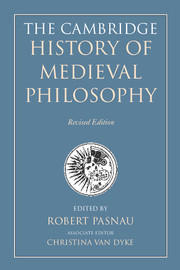Book contents
- Frontmatter
- Contents of Volume 1
- Preface
- List of contributors
- Frontmatter
- Contents of Volume 2
- Introduction
- I Fundamentals
- II Logic and language
- III Natural philosophy
- IV Soul and knowledge
- V Will and desire
- VI Ethics
- VII Political philosophy
- VIII Metaphysics
- IX Theology
- Appendices
- Bibliography of primary sources
- Bibliography of secondary sources
- Index nominum
- Index rerum
Preface
Published online by Cambridge University Press: 05 August 2014
- Frontmatter
- Contents of Volume 1
- Preface
- List of contributors
- Frontmatter
- Contents of Volume 2
- Introduction
- I Fundamentals
- II Logic and language
- III Natural philosophy
- IV Soul and knowledge
- V Will and desire
- VI Ethics
- VII Political philosophy
- VIII Metaphysics
- IX Theology
- Appendices
- Bibliography of primary sources
- Bibliography of secondary sources
- Index nominum
- Index rerum
Summary
The present pair of volumes succeeds, without superseding, The Cambridge History of Later Medieval Philosophy, published in 1982 by Norman Kretzmann, Anthony Kenny, Jan Pinborg, and Eleonore Stump. It is a considerable privilege to edit the successor to Kretzmann et alii, for that volume distils the work of a brilliant generation of scholars without whom our own scholarly careers would be almost inconceivable. These volumes are entirely new, but we expect their predecessor will remain valuable for many years to come, especially for its detailed treatment of medieval theories of logic and the philosophy of language.
The present volumes differ most notably from their predecessor in three ways: first, their scope extends not just to Christian but also to Islamic and Jewish thought; second, they cover not only the later Middle Ages but also earlier centuries; third, they address in some detail the entire spectrum of medieval thought, including philosophical theology.
Each chapter in these volumes stands on its own, but there are numerous points of contact between chapters, and we have liberally supplied cross-references. One could thus in principle begin reading anywhere and eventually, by following these links, make one’s way through the whole. Readers will also want to consult the biographies of medieval authors, in Appendix C, for extensive information on the lives and work of the figures discussed in the chapters.
- Type
- Chapter
- Information
- The Cambridge History of Medieval Philosophy , pp. ix - xPublisher: Cambridge University PressPrint publication year: 2014

